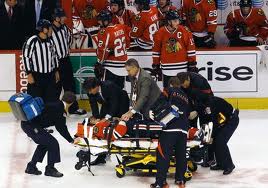Wherever we are located, many of us are likely to be enjoying these two events, featuring enormously skilled athletes and very intense competition. But we are probably also groaning about many habits and incidents that detract from the overall experience, especially if we have a particular interest in refereeing and fair play. The impression is that we can consider ourselves comparatively lucky when we focus on rules and elite level refereeing in handball. But there are also indications of dangers and lessons to be learned.
The most conspicuous problem in the late stages in the regular season in the NHL and now in the play-offs is the total deterioration in the respect among players for the well-being of the opponent. Hard hitting and desperate methods can be both understood and tolerated, but an epidemic of actions which are either intentional or totally careless is putting many star players on the side-line with major injuries. Hits against the head, often causing long-lasting concussions, seem to be the ‘favorite’ method for the moment. The NHL tries to use suspensions as a deterrent, but there is no indication that this is really discouraging these actions.
Fortunately, we have yet not seen the quite same the cynicism in our recent, major events in handball. In our case it is more a matter of isolated incidents. But ‘flying elbows’ or fists to the face are dangerous actions that can far too easily occur in handball, especially if the referees are not alert and courageous, and if the federations to do not take such matters seriously enough.
In the case of NHL, I see a connection to another problem that I ‘desperately’ want us to avoid in handball. It is a tendency, or mentality, that may be relatively more common here in the U.S. What I am talking about is the attitude that in the play-offs, or in the final minutes of any game, “you should put the whistle away and let the players decide the outcome”. This has been more conspicuous than even in this year’s Stanley Cup, but to my mind it is totally misguided! First of all, it does not lead to fairness and a proper outcome if you ignore fouls and other violations. What simply happens is that the most cynical teams and players take advantage by being ruthless. Is this really what we want? And even worse, it creates an escalation on the ice/court so that finally there is a sense that ‘anything goes’ , with more and more dangerous action (including elbows to the head) and revenge fouls.
In the case of UEFA and Champions League, I want to focus on two issues. The first one involves ‘theater’, especially in terms of exaggerating the impact of a minor body contact or completing faking the existence of a foul from an opponent. In my opinion, football is getting worse and worse in this respect, mainly because there is too much tolerance for it. It creates major irritation between players, it leads to fouls and other forms of misbehavior, it creates a loss of respect for the referee. We really need to be careful in the handball and must be more prepared to take tougher action against such tendencies before these unpleasant habits become as common in handball as in football.
And then there is an issue related to an inherent advantage that we have in the handball rules, an aspect that we must take great care to protect and preserve. I am talking about the distinction between punishments for fouls and the restoring of a goal chance that has been illegally removed. It is terrible to see that football is not more rapidly dealing with the issue of ‘double punishment’ (penalty kick AND red card) for removing a clear scoring chance in the goal area. This is really unconscionable. But it also tells us that we in handball must take great care to make our referees understand the right situations for: 7-meter only; personal punishment but no 7-meter; both 7-meter and personal punishment. Another rules aspect that will not realistically change: in football the penalty kick depends simply on the position and not on scoring chance. This means that shirt pulling in the penalty area causes the referees to decide either to see what happens or to close their eyes. Perhaps this unsatisfactory effect should be remembered by those who think that we allow too much subjective judgment for the decision about a 7-meter in handball. I am sure that many football referees would love to have that prerogative!

